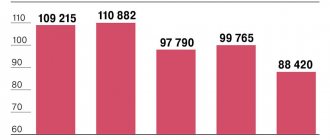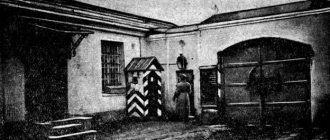The Russian penal system is quite complex, including preventive measures in the form of suspended sentences, house arrest, many types of correctional institutions, including colonies for minors, special prisons for former law enforcement officials, etc.
It is not possible to understand all types of criminal punishment within the framework of one article, so we will touch on only a small part of it - we will find out how the regimes in the colonies of the Russian Federation differ.
Division of correctional institutions into categories
The Criminal Executive Code of the Russian Federation provides for 4 options for the conditions of detention of prisoners:
- colony-settlement;
- general mode;
- strict regime;
- special regime.
The decision on the punishment is made by the court. When determining the regime of a correctional institution, the severity of the crime committed and the number of “walkers” are taken into account. The difference between a settlement colony and a general regime colony, general and strict regime, strict and special is:
- the procedure for serving the sentence;
- living conditions;
- level of security and supervision.
Features of the execution of punishment in correctional institutions of various categories are described in detail in Chapter 16 of the Penal Code of the Russian Federation. Here we will not reproduce the text of the official document, but will provide specific comparisons of the modes.
General
Many people who are interested in the question of why they are given a strict regime should know that they only end up in such correctional institutions for very serious criminal acts. For example, if an attacker has already served a sentence for taking the life of another person, and again committed the same act at a time when the criminal record had not yet been expunged, then he will be considered a repeat offender. Consequently, the judicial authority will send him to serve his sentence only under strict conditions.
If a person has committed an act for the first time, the sanctions for which exceed ten years in isolation from society, for this the perpetrator will also be sent to a strict regime. There are no prisoners here who simply shoplifted bread or punched another person in the face.
Therefore, when answering the question of why a guilty person is sent to a maximum security colony, for what crimes, it is necessary to turn to the norms of the current law. The Penal Code states that citizens who committed very serious acts for the first time, as well as repeat offenders, serve their sentences in such institutions. Even with excellent behavior and performance, convicts under strict regime are not always given parole. However, they are transferred to easier living conditions.
How does a colony-settlement differ from the general regime?
A colony-settlement is a territory of relatively light restriction of freedom. Convicts here are not locked in cells, they can move freely around the territory of the correctional institution, and, upon receiving the appropriate permission from the administration, can go to study and work in the city and even live outside the correctional institution with their family. In KP there are no restrictions on the number of dates, parcels, transfers, receipt and spending of funds.
The difference between a settlement colony and a general regime colony also lies in the number of convicts held. If prisons in Russia are divided into men's and women's, then in free settlements there are dormitories for convicts of both sexes. People who have committed crimes of light and moderate gravity for the first time, as well as those who have violated the criminal law unintentionally, through negligence, are placed under conditions of minor restriction of freedom.
And finally, the third thing that distinguishes a colony-settlement from the general regime is the high value of labor. Attitude to work here is a measure of the degree of correction of the convicted person. Conscientious work is regarded as evidence of developed self-discipline, a person’s ability to adapt socially and lead a normal life in society. You can get parole for a good attitude to work.











